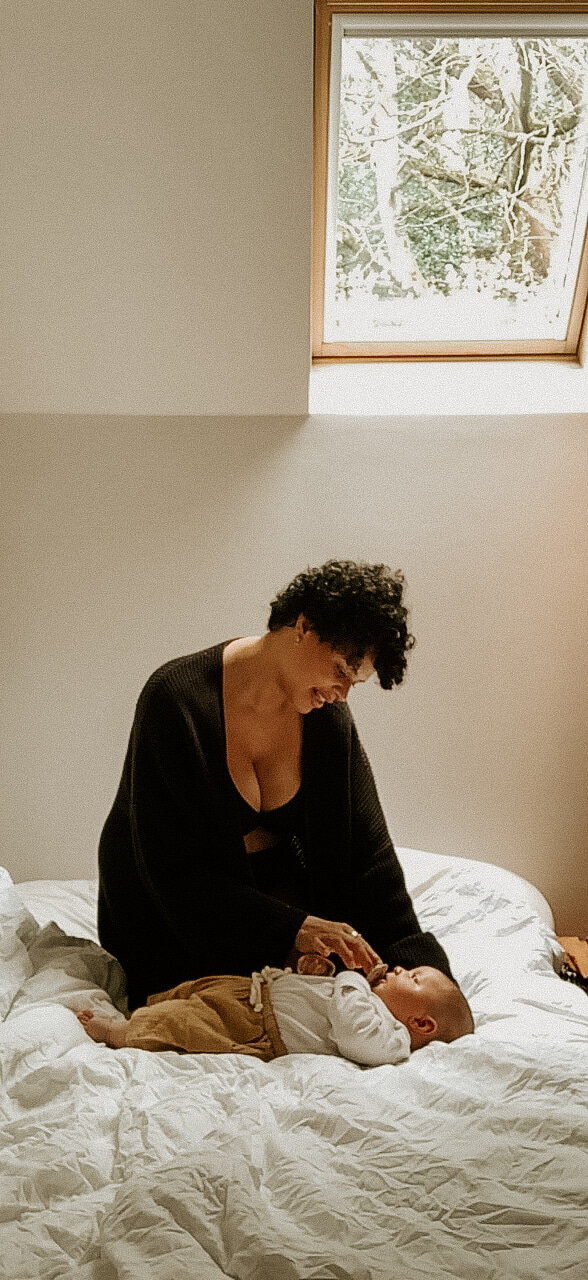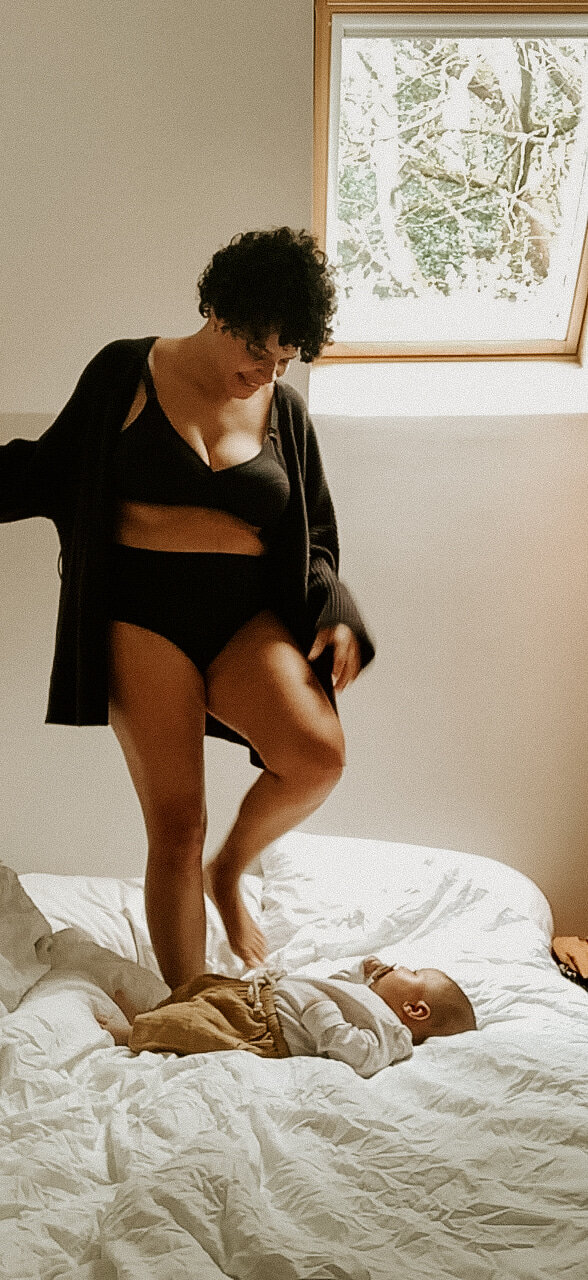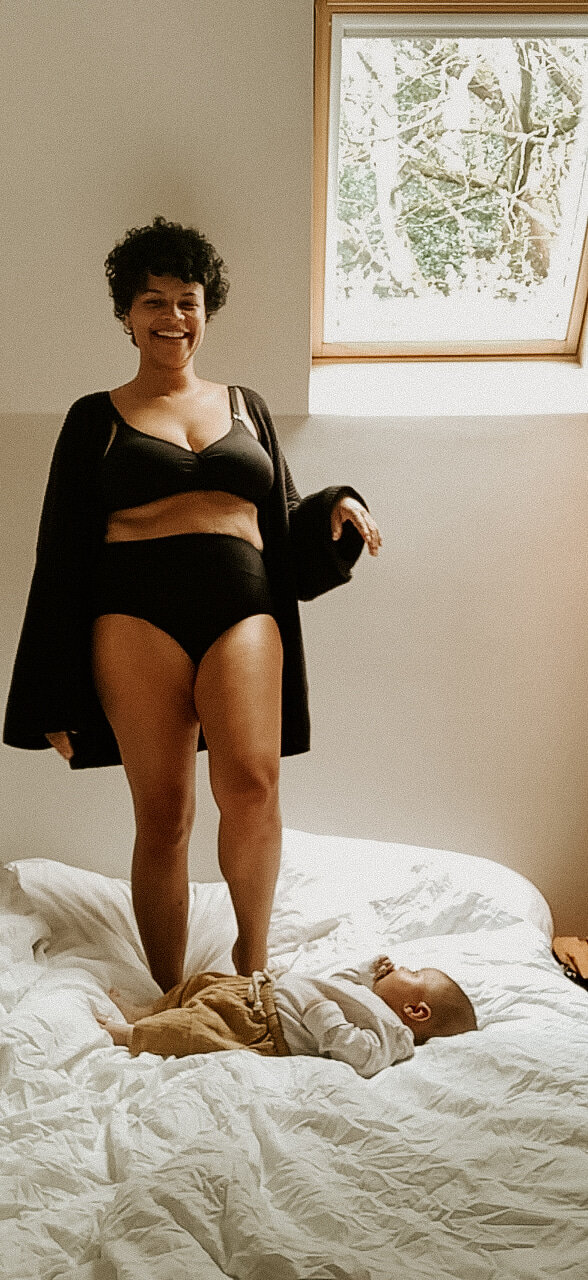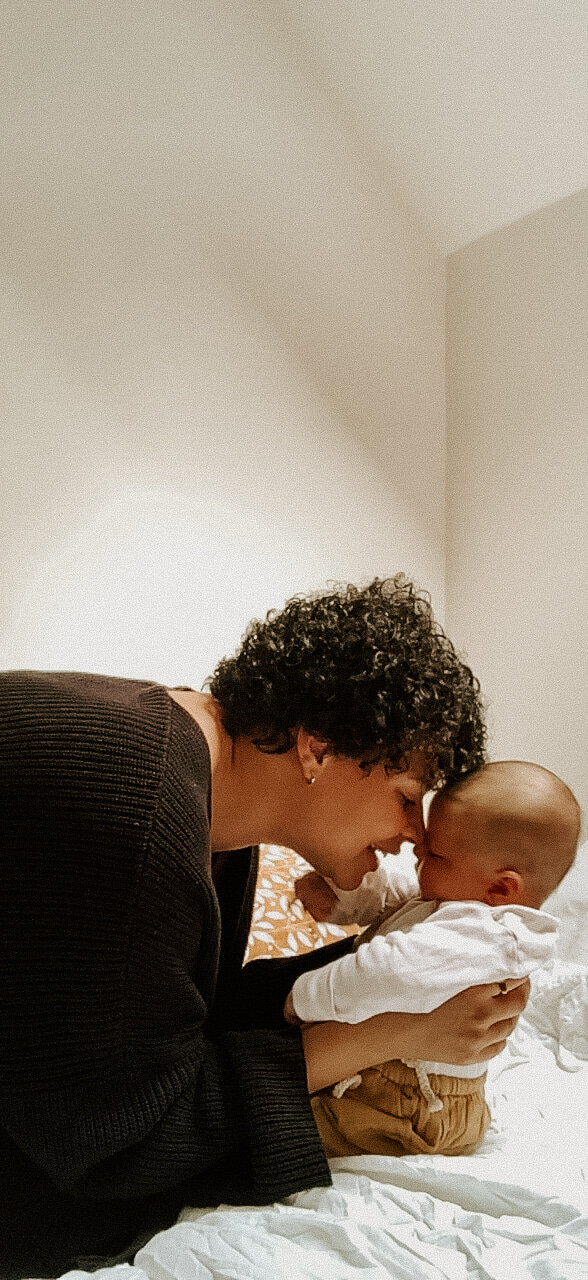Leata-Mae d’Avoine on Postpartum Aftercare & Identity Shift, UK
Photography by Trina Cary Photography
Leata-Mae d’Avoine is a mother, full spectrum doula and holistic wellbeing facilitator based in Jersey, the Channel Islands. Leata-Mae focuses on informing & empowering those giving birth when it comes to their self care and self love, while advocating for reproductive, racial & birth justice.
Can you share a little bit about your background and what inspired you to become a doula?
I’ve had many different ‘professions’ and experiences, from working in retail to brand marketing to energy healing to mentoring. Along with my personal experiences in life, it’s all been a part of my journey to getting closer to the work that matters most to me and that resonates with my being. As cliché as it sounds, I think doula work found me more than my searching for it as a profession.
Long story short, I had just moved to New York with my partner and was hoping to find ways to further my knowledge on healing practices. I started seeing posters and leaflets and articles with the word ‘doula’ constantly popping up, so I looked into it. The more I found out,the more I realised this was something I needed to pursue. That was the start and I’ve never looked back. It’s sacred work that I’m constantly a student of and I’m honoured that I get to work with families at a time that’s so important and life changing to them.
In your experiences as a parent and as a doula, what are some of the things that those giving birth are often the least (or not at all) prepared for postpartum?
The postpartum experience as a whole brings up a lot that we aren’t prepared for. I think emotionally and mentally, as much as you can try to explain it, a huge part of the journey can’t be understood unless you’ve experienced it yourself. You don’t get any time to process all of the changes that take place while you’re knee deep in baby clothes, milk and tears. So it leads to overwhelm. You can feel like you’re suffocating a little and I think that comes as a shock to those who maybe didn’t realise that it’s not always as cute as Instagram photos make it seem.
I recommend finding a balance between going with the flow and doing whatever works for you, as well as acknowledging when it’s too much and you need a breather. You don’t have to ‘soldier on’.
Then there’s the physical side. And what a ride that is! Your insides literally contort and shift and some of those adaptations aren’t so comfortable. It takes 10 months for your body to adjust and make room for this growing life. Then we are fed this belief that after all that, it’s only roughly six weeks to recover! That couldn’t be further from the truth. First of all, there isn’t a one-size-fits-all time frame. Each body goes through it’s individual experience, each body heals differently. And it’s important to not rush recovery.. Instead, it should be about honouring the process and getting all the information and help you can to support your body in ways that feel good to you.
What do you wish more women & people giving birth knew about this transformation?
I wish they knew they weren’t alone in any of this. That each experience is individual, but there are so many common threads that run through each journey that tie us together. It’s a lot. It can hit you like a ton of bricks and it’s not always easy.
There are physical and emotional transformations that happen all at once and you can feel like you don’t get any time to adjust or work through them, and that’s why it’s so crucial to try and create a postpartum aftercare plan. Everyone needs some sort of support that can help ease these transitions, and it may not even look like the things you’d assume. Maybe you need friends and family lined up to take shifts. Maybe you need funding. Maybe you need a physical therapist, or a counsellor, or to connect with ancestral practices, or foods to bring comfort - whatever it is that makes you feel supported and not alone. Know there’s absolutely no shame in asking for help.
Think of a postpartum aftercare plan like an extension of your birth plan. It’s about creating a list that honours and clearly communicates your needs during the first few weeks post-birth. You want to include all your ideal ways of being supported, starting with practical help. That could look like hiring or arranging help for the first week or so while you adjust. Maybe someone to do light housework, prepare meals, watch your baby while you nap, etc. Perhaps it’s discussing with your partner the ways in which they can be of service to you, bringing you meals or snacks in bed or sharing a feeding routine of bottle feeding between the two of you.
You also want to think about the things that make you feel comforted. These are personal to you - maybe start with finding out what your love language is and the ways that make you feel special. Would you like affirmations said to you or posted around the room? Maybe you’d like scheduled alone time or quality time with your partner. It could even be things like a massage or other body work treatment like acupuncture.
Lastly, an important section to include in your plan is boundaries and what you expect from others. This could apply to visitors or family members. Discuss the ways in which you think would be most beneficial to you and your family as you transition into parenthood.
The purpose is to create an aftercare plan that has all of the things that will make you feel empowered and at ease as much as possible. It’s there to allow you room and time for recovering physically, as well as feeling supported mentally and emotionally.
As a doula, what have you seen to be the greatest needs for someone postpartum?
Support! From systems, from professionals, from families, from peers, from society. It’s wild to think a huge chunk of the population goes through the demanding experiences of pregnancy, labour and birth, creating the next generation, and then we just pat them on the back and talk to them about contraception and how to fit back into pre-pregnancy jeans. We expect them to be on their way with no education, no affirming knowledge on how to nurture their nutrition and health, no free services to help, limited financial support, unsolicited advice and outdated guidance.
There seems to be a general lack of care and understanding, and a lack of acknowledgement that ‘Whoa, you’ve just been through something that’s life changing’. We should be saying, ‘You’re a badass and right now your body and mind are depleted, so you deserve all that you need to heal, without time restraints and with all the information and help available.’
What’s the most beneficial way to support a person's own postpartum experience - physically, mentally, and emotionally?
One of the key things that’s most beneficial in supporting your postpartum journey is nutrition. You don’t realise just how depleted you are and how long it can take to restore that vital health - especially if breast/chestfeeding - that allows you to function from a better place. Placing importance on the right nutrition leads to you having better energy, better sleep, better headspace, just generally better wellbeing. You can’t pour from an empty cup.
Another beneficial way to support yourself during postpartum is to honour your feelings. Let them come up and flow out. Talk to someone you can trust or who has been through something similar. Write it all down as a way of releasing it - don’t let it build up. I can pretty much guarantee you’re not the only one thinking or feeling the way that you do.
Leata-Mae’s Nutrition Tips
For basic nutrition needs to be met, try to include a wide variety of foods that will support your healing. Reduce or avoid processed or packaged foods and look for meal ideas that include healthy fats, proteins and carbohydrates - such as chicken or bone broth soup, oatmeal and fruit, salmon and leafy greens, as well as snacks like nuts, avocados, eggs, hummus, sweet potatoes. Warming foods will help to better your blood circulation which contributes to recovery time.
Include foods that bring you comfort - don’t restrict or challenge yourself. If you have a craving, honour it. If you have an ancestral or traditional dish that makes you happy, eat it. Nutrition is also about what makes you feel good, it’s not just about ‘health’.
Keep taking prenatal vitamins. I recommend whole food based supplements, as they allow your body to absorb the nutrients better. And remember to keep up with staying hydrated, especially if you’re breast/chestfeeding. Never underestimate just how important water intake is.
Some of my favourite nutritionists & recipe profiles to follow on Instagram are:
@ohbabynutrition, @black.nutritionist, @lilynicholsrdn, @lifes_recipe, @villageformama
Can you share 5 practical ways to navigate the identity shift that many face during the transition to motherhood/parenthood (ones that help women find themselves’ again)?
Firstly, allow yourself to mourn your old life, your old freedoms and normals. It’s okay to miss the things that you maybe don’t have the time or energy to do right now. Not every part of parenthood has to be enjoyed and that doesn’t make you a bad parent, it makes you human.
Navigating the identity shift is one of the most common difficult transitions to face once entering or reentering parenthood, and the main thing to understand is that you have to stop trying to get back to who you were before. That person isn’t you anymore, a lot has changed and it’s about going with that change rather than trying to find a person you used to be that doesn’t have the same experiences as you do now. And that’s a good thing! Change is necessary. Change is growth. That’s not to say you have to let go of everything that makes you happy or feel like ‘you’, but it’s more about finding a balance. Find the excitement in getting to know the new you. Re-shift your goals and self expectations. Focus on what it is that makes you happy and fulfilled and follow that - baby in arms if need be!
My 5 practical ways to navigate this identify shift include:
1: Find something in your daily routine that doesn’t revolve around your children/family. Even just 10 minutes a day, do something that’s solely about or just for you.
2: Take time for self-care and self-love. Pamper yourself, get your hair done, take a long candlelit bath alone, get dressed up even if you’re going nowhere. Do things that make you feel like you’re taking care of yourself or that make you feel a little pleasure. It’s the least you deserve. Indulge in you.
3: Prioritise rest. That old saying of nap when the baby naps? Do it. No matter how old the baby is. If sleep isn’t something that’s doable (maybe with other older kids around), then still try and find time to rest. Find moments where your body is still and you can let your mind be too. Tell yourself you’re on pause. No list making, no chores, no planning, no worrying. Just time to take deep breaths and connect with your present self.
4: Get into a new or old loved hobby. Finding something to do other than parenting a tiny human all day is really important. It means you get to focus on something different - something that doesn’t feel mundane or like a duty. It doesn’t have to be anything that makes you feel productive, it can just be for the simple joy or peace it brings. It will help to make you feel like parenting isn’t your only contribution.
5: Get help. Whether it’s from your partner, family, friends you trust or even a babysitter, get some support that enables you to have alone time to focus on you and have a breather. Take a walk alone, go and grab a coffee, take a shower and rest. Whatever it is, creating a support network will allow you to step outside of your ‘parent’ role just for a moment.
What do you consider the most necessary self-care practices during the first few weeks postpartum?
Get the basics covered - food, sleep and rest.
Rest is vital. I tell all my clients to not get out of bed for at least a week. To not even leave the house for at least a few weeks if possible. Eat in bed, sleep in bed, watch a Netflix show while trying to breast/chestfeed in bed. Round up all the help you can so you don’t have to think about laundry or meals or household tasks or work. Focus on sleep, food and baby. That’s it - everything else can wait.
If journaling is something that resonates, then that’s always a good practice to keep up - even if it’s just writing down a sentence for the day. It’s a way of releasing any pent up thoughts or emotions, and a way of checking in with yourself so you aren’t completely buried in the overwhelm. Sometimes you might not feel the way you expected to, and that can be a lot to juggle. If you have someone to hold space for you during this time, that’s a great support too.
Another thing to nurture during those first few weeks is your physical body. Look after it like you do your newborn. Wrap yourself in gentle love. Take as many baths as you can. Gently and slowly stretch. Drink herbal teas.. Rub moisturising oils into your thirsty skin. Eat warming, comforting foods. Gently massage your womb space. Thank your body for its strength. Keep up or start practices that honour your body. Do the things that make you feel a little more ‘together’ or that give you a little time to yourself so that you can love on you.
It’s all about individualised care - only you know what makes you and your body feel good, so it’s really about following your intuition and practicing self-care that reflects that. A few examples could be:
Exercise or movement that allows you to feel peaceful and energised
Using luxury oils and giving yourself a whole body massage after soaking in a herbal bath
Mediation sessions
Practices like vaginal steaming
You may already have rituals or routines that bring you comfort and allow your body to relax. Make time to intentionally keep up those practices for the sake of your overall wellbeing as you start your healing journey after birth.
It’s also necessary to acknowledge that the postpartum recovery is so much more than a few weeks. For some it takes months or even years to get to a state of feeling healed or even comfortable with a new normal. That’s not to scare you or make the experience feel daunting - it’s actually to empower you so that you can let go of feelings of shame or guilt or inner criticism. It’s important to mentally give yourself a break, know that you shouldn’t be expected to ‘bounce back’, and that it’s okay to take as long as you need to. Becoming your own main focus isn’t selfish, but what’s needed for your family to thrive.
Interview with Leata-Mae D’Avoine






